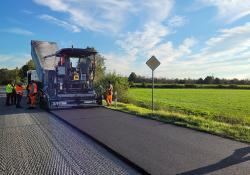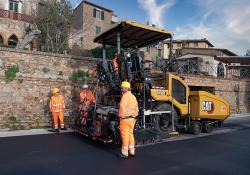Italian asphalt and road association fights economic downturn with plans to relocate the Italian asphalt industry’s leading show, Asphaltica, to Verona
TheSITEB’s agreement with
Moving Asphaltica makes sense for SITEB and its 300 members, who cover all aspects of the asphalt industry, not least for commercial reasons. Since both Samoter and Asphaltica were due to be held in 2014, some exhibitors would have been forced to choose between the two had they continued to be in different locations.
SITEB director Stefano Ravaioli said that relocating to Verona would also help to attract more international exhibitors and visitors. The tough economic situation faced by asphalt-related companies in their home market in Italy was underlined by the size of the 2012 Asphaltica show – half that of previous events.
“When we created Asphaltica, Padua was a good venue because it was a small exhibition,” said Ravaioli. “Now we want to internationalise this exhibition, we need a different exhibition centre,”
Asphaltica must also provide a strong platform for the industry’s players to make the case to government and other clients for asphalt roads, said Ravaioli. Asphalt is under attack from concrete roads, with proponents of concrete claiming that it is a more sustainable solution, something with Ravaoili refutes.
“If you look at the life cycle assessments of the two materials, you will find that hot mix asphalt produces less pollution than concrete,” said Ravaoli. Life cycle assessments look at the environmental impact of a material over its whole life, and since bitumen is by-product of the oil refining process, using it in roads is a positive use of a ‘waste’ product.
Rising bitumen prices, as more and more of Italy’s ageing refineries are closed, also adds weight to concrete’s argument. But Ravaoili said that specifiers should consider the logistical benefits of asphalt which is quicker and easier to lay than concrete and can take traffic much sooner.










